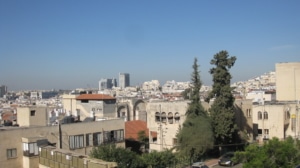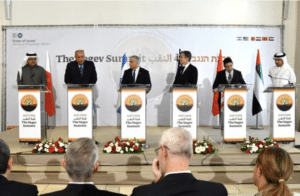Eleven Israelis Killed in Three Terrorist Attacks

Bnei Brak, Israel (Source: deror_avi/Wikimedia Commons)
In Israel, there have been three recent terrorist attacks. These attacks are the worst terrorist threats Israel has seen in recent years. Over eight days, eleven Israelis have been shot and murdered in horrible crimes. The police and military are at their highest alert level since last May’s Gaza rocket strikes. Prime Minister Bennett said, “Israel faces a murderous Arab terror wave . . . We will fight terrorism with persistence, diligence and an iron fist . . . We will win.” In the first attack, a Palestinian in Be’er Sheva attacked and killed four shoppers outside a mall with a knife. A few days later, two terrorists from an Arab-Israeli village shot two border policemen. Finally, late last week, a Palestinian with an automatic weapon drove on his motorbike through a suburb of Tel Aviv. He killed five people.
Defense Minister Benny Gantz said, “The entire defense establishment—the IDF [military], the Shin Bet and the police—will give every effort in order to return security to the streets of Israel and a sense of security to the citizens.” These killings come at a sensitive time. The Negev Summit was wrapping up, which brought Gulf State neighbors together to work for peace. Meanwhile, Hamas and Fatah welcomed the “heroic operation which is the natural response to the crimes of the occupation against the Palestinian people.” Tensions are high in Israel. Ramadan has started. The annual “Land Day,” which typically sees large-scale protests and riots against Israel on the Gaza border, also started last week. This year, the demonstrations will take place along Gaza’s coast, not at the Israeli border, in order to reduce tensions and potential clashes. Israel has also heightened security around the West Bank and Gaza.
Please pray for those who are mourning the horrible and untimely death of their loved ones. May there be peace in Israel.
Historic Negev Summit Meets in Israel

Negev Summit (Source: “The Jerusalem Post”/Israel Foreign Ministry)
Israeli Foreign Minister Yair Lapid recently hosted the Negev Summit with United States Secretary of State Antony Blinken. Their counterparts from Egypt, Bahrain, the United Arab Emirates, and Morocco also participated. The conference took place in Sde Boker, where Israel’s first prime minister, David Ben-Gurion, lived and is buried. Lapid quoted him, “History isn’t written; history is made.” He continued, “What we are doing is building history, a regional architecture based on tolerance and security cooperation.” The conference is possible due to the Abraham Accords. Each country wishes to strengthen regional security against threats from land and sea.
Blinken said the countries at the summit “will also work together to confront common security challenges and threats, including those from Iran and its proxies.” Israel and the Gulf States have been dismayed at the expected results of the talks with Iran. Meanwhile, those attending the summit have agreed to establish working groups related to counterterrorism and defense, education, health, tourism, food, water, and energy. They are planning to meet twice a year and invite the Palestinians to join them. As Lapid put it, the group wants to work toward a “shared future of progress and success.”
Please pray for the success of the Negev Summit and continued peaceful cooperation between all the regional countries represented.
Israel Prioritizes Food Shipments

There is currently a shortage of egg imports in the wake of the conflict between Russia and Ukraine (Illustrative/Source: Jakub Kapusnak/Unsplash)
Many fear food shortages because of the Russian invasion of Ukraine. In response, Transportation Minister Merav Michaeli has instructed the Shipping and Ports Authority to first unload ships carrying livestock and then ships carrying grain and fodder. Afterward, all other kinds of cargo can be unloaded. She said, “We face challenges to our food security at the moment due to the worrying developments in Ukraine. . . . The State of Israel must protect its food security by strengthening our domestic agriculture.”
Ukraine is a key exporter of wheat to Israel. Together, Ukraine and Russia supply 30 percent of wheat in worldwide markets. The same is true of eggs, as Israel expects a shortage right before the Passover holiday when Israelis consume more eggs. Ukraine sends 30 percent of the 100 million eggs Israel receives annually. Israel is looking to buy from Poland and Bulgaria to help with the shortage.
Please pray for those countries who will face serious food shortages as a result of the war in Ukraine.
Read more about Israel’s egg and wheat shortage. . .
Read more about how Israel’s ports are preparing for food shipments. . .
Passover Is Coming

Passover begins at sundown on Friday, April 15 (Source: Alex Shute/Unsplash)
The month of April brings the much-anticipated Passover season in Israel. For many, it is one of the most special times of the year to gather with family and friends, eat unique and delicious foods, and celebrate the Lord’s redemption that He has provided for us. Many think that the celebration is just about freedom from Egypt and the trek to the Promised Land.
The roughly 20,000 Israeli believers in Jesus, though, also know that Jesus, the Lamb of God, has delivered us from sin! We plan to have many Seders—both family and group Seders. We pray that we can be a testimony to many. Right now, Israel is very tense and praying for peace and safety.
Please pray that the shalom that only Jesus brings will be with us as we plan and prepare for this special time of ministry. May this shalom also fill our streets, stores, and parks.




